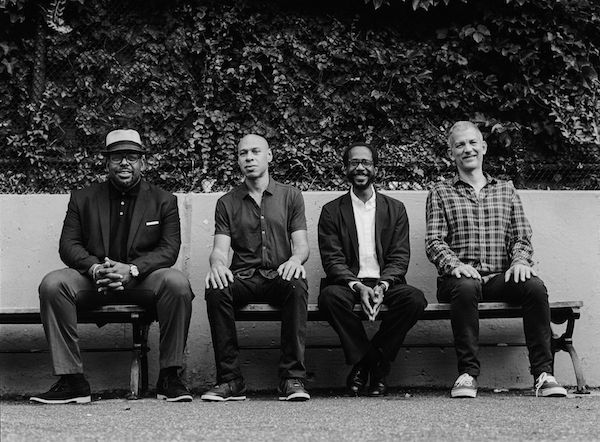Jan 13, 2026 2:09 PM
More Trump-Kennedy Center Cancellations
The fallout from the renaming of the John F. Kennedy Center for the Performing Arts to include President Donald…

Bassist Christian McBride (left), saxophonist Joshua Redman, drummer Brian Blade and pianist Brad Mehldau reconvened in the studio after more than two decades for RoundAgain.
(Photo: Michael Wilson)“Rejoice,” from MoodSwing, and “Right Back Round Again,” from RoundAgain, both begin and end as vamp-based, riff-driven vehicles. The stunning virtuosity, deep-seated groove and exuberance are evident from the start on the former track, maintaining their omnipresence with no drop-off in the latter. However, a closer listen might reveal indicators of when each track was recorded. Maybe now, there’s more intricacy of harmony and melody, with subtle yet surprising shifts in texture and pacing, and an old-soulfulness cleverly grounding the music. The newer track is also just nearly half as long as its predecessor, suggesting that these players now are able to say more with less. To that point, RoundAgain sports seven tracks to MoodSwing’s 11 and features compositions by all four artists; Redman previously was the sole composer.
“I feel like we all went into this for very un-nostalgic reasons,” Redman said about the new recording, though he noted their tour was billed “as a sort of reunion. But it was very important for all of us going into it that this wasn’t a recreation of the Joshua Redman Quartet of 1994.”
The saxophonist simply was looking to reconnect with his longtime friends and see what came of it.
“I wasn’t prepared for the sense of familiarity and comfort that was there from like, beat one,” he continued, discussing two nights of shows prior to recording RoundAgain at the Falcon, a midsize performance space in upstate New York. “But as soon as we hit the blowing part and launched into this 4/4 swing, it was like, ‘Yes, this is us, I remember this! ... We’ve all experienced so much and grown so much as musicians and as people, but there was some sort of collective entity, some sort of self that exists, that we had established as a band. ‘Us’ is actually a thing.”
The saxophonist considers himself lucky to have had his career start when it did; he’s never had to figure out how to promote himself through social media, leaving his management team to run his online presence. “I don’t know how to log on to Facebook,” he admitted, sheepishly. “I’ve got some weird jazz generational privilege, where I don’t have to deal with social media.”
The word “privilege” might have come to Redman’s mind more easily at this point in time, when society as a whole seems to be on the threshold of an awakening. Redman and Blade spoke with DownBeat only weeks after the police slaying of George Floyd, an event that’s shaping how the world confronts racism.
“It’s affecting me in these massive waves of confusion,” said the drummer, who’s been revisiting sermons and speeches from the civil rights era to better understand the context of this hate. “[H]ow long will this inhumanity continue and exist and change form?” he lamented, wondering why racial animus could “still be something that would take life or jeopardize anyone else’s existence.”
“It’s made me think more than I ever have before about my own role as an artist, or lack of a role,” Redman said of the Black Lives Matter movement.
“I don’t consider myself someone who came from privilege at all,” continued Redman, the son of tenor saxophonist Dewey Redman—a Black man—and raised by his Jewish mother. “But in a way, I’ve led a privileged life. And as an artist, there’s a certain kind of artistic privilege I’ve had, a certain kind of ‘jazz privilege’ to create the music that I want to create, in relative comfort and joy and not having had to take a stand.”
The moment is especially poignant for Redman, both because of his heritage and because of the music he loves: “For me as a jazz musician, one of the aspects of jazz—which has always had the most profound hold on my soul—has been intertwined with the Black experience, with the sounds and expressions that came from Black culture. Now, it’s a music that belongs to the world, but the Black experience has always been an essential part of this music. For me, I’ve had the privilege of being able to make this music and engage with that and try to make it my own. So, my question is, have I done my part? Have I paid it back or can I pay it forward?”

Belá Fleck during an interview with Fredrika Whitfield on CNN.
Jan 13, 2026 2:09 PM
The fallout from the renaming of the John F. Kennedy Center for the Performing Arts to include President Donald…

Peplowski first came to prominence in legacy swing bands, including the final iteration of the Benny Goodman Orchestra, before beginning a solo career in the late 1980s.
Feb 3, 2026 12:10 AM
Ken Peplowski, a clarinetist and tenor saxophonist who straddled the worlds of traditional and modern jazz, died Feb. 2…

The success of Oregon’s first album, 1971’s Music Of Another Present Era, allowed Towner to establish a solo career.
Jan 19, 2026 5:02 PM
Ralph Towner, a guitarist and composer who blended multiple genres, including jazz — and throughout them all remained…

Rico’s Anti-Microbial Instrument Swab
Jan 19, 2026 2:48 PM
With this year’s NAMM Show right around the corner, we can look forward to plenty of new and innovative instruments…

Richie Beirach was particularly renowned for his approach to chromatic harmony, which he used to improvise reharmonizations of originals and standards.
Jan 27, 2026 11:19 AM
Richie Beirach, a pianist and composer who channeled a knowledge of modern classical music into his jazz practice,…